Nu History
Item set
- Title
- Nu History
Items
-
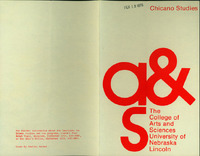 This is a pamphlet which was printed by the College of Arts & Sciences and distributed in 1976 to promote the curriculum in the new Chicano Studies Program. Chicano Studies debuted at the University of Nebraska-Lincoln as a minor field of study. Requirements for the minor are included in the pamphlet. Cover by Shelley Becker. Classes include: Anthropology 250 - Indians of Latin America, English 116D and 245D - Chicano Literature, History 356 - History and Culture of the Mexican-American and Sociology 217 - Nationality and Race Relations, among others (click on thumbnail to enlarge image).
This is a pamphlet which was printed by the College of Arts & Sciences and distributed in 1976 to promote the curriculum in the new Chicano Studies Program. Chicano Studies debuted at the University of Nebraska-Lincoln as a minor field of study. Requirements for the minor are included in the pamphlet. Cover by Shelley Becker. Classes include: Anthropology 250 - Indians of Latin America, English 116D and 245D - Chicano Literature, History 356 - History and Culture of the Mexican-American and Sociology 217 - Nationality and Race Relations, among others (click on thumbnail to enlarge image). -
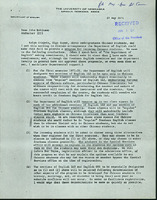 This is a letter sent to Dean John Robinson of the college of Arts & Sciences from Ned Hedges, the director of freshman English at UNL. In this letter Hedges suggest in detail the program for Chicano education that the English department is willing to support. Hedges, along with Ralph Grajeda,Olga Tappe and three graduate students, proposes sections of English literature that not only would use Chicano writings, but would also reserve a class to only have Chicano students. The plan outlined also states that there will be further developing classes for Chicanos in the history, art and sociology departments (click on thumbnail to enlarge image).
This is a letter sent to Dean John Robinson of the college of Arts & Sciences from Ned Hedges, the director of freshman English at UNL. In this letter Hedges suggest in detail the program for Chicano education that the English department is willing to support. Hedges, along with Ralph Grajeda,Olga Tappe and three graduate students, proposes sections of English literature that not only would use Chicano writings, but would also reserve a class to only have Chicano students. The plan outlined also states that there will be further developing classes for Chicanos in the history, art and sociology departments (click on thumbnail to enlarge image). -
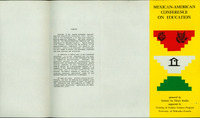 This is the pamphlet for the Mexican-American Conference on Education which was held May 2-4, 1973. This conference was held at the University of Nebraska and the leaders of discussion were people who were on the Presidents Advisory Committee on Mexican-American Affairs. Topics of discussion included "Mexican-American Education - Federal Funds" led by Ralph Grajeda, "Teacher Preparation at the University of Nebraska" led by Simon Orta, and "Evaluation of conference...and presentation of the recommendations to the administration of the University of Nebraska" led by Sam Franco (click on thumbnail to enlarge image).
This is the pamphlet for the Mexican-American Conference on Education which was held May 2-4, 1973. This conference was held at the University of Nebraska and the leaders of discussion were people who were on the Presidents Advisory Committee on Mexican-American Affairs. Topics of discussion included "Mexican-American Education - Federal Funds" led by Ralph Grajeda, "Teacher Preparation at the University of Nebraska" led by Simon Orta, and "Evaluation of conference...and presentation of the recommendations to the administration of the University of Nebraska" led by Sam Franco (click on thumbnail to enlarge image). -
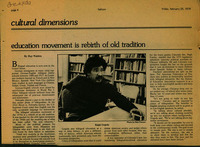 This article, written by Ray Walden, appeared in the Daily Nebraskan on February 2, 1978. The article describes the debate about bilingual education in the United States and points out that Nebraska, in 1922, played apart in the monolingual, English only, education system in the USA. It describes the opposing points of view of those in favor for and those against bilingual education. By looking at education in Nebraska within the larger national context of race and education Professors Ralph Grajeda and Miguel Carranza explain the importance of education with a cultural perspective (click on thumbnail to enlarge image).
This article, written by Ray Walden, appeared in the Daily Nebraskan on February 2, 1978. The article describes the debate about bilingual education in the United States and points out that Nebraska, in 1922, played apart in the monolingual, English only, education system in the USA. It describes the opposing points of view of those in favor for and those against bilingual education. By looking at education in Nebraska within the larger national context of race and education Professors Ralph Grajeda and Miguel Carranza explain the importance of education with a cultural perspective (click on thumbnail to enlarge image). -
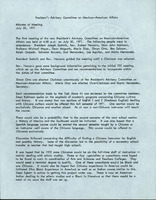 This document is the minutes from the first meeting of the Presidents Advisory Committee on Mexican-American Affairs. The minutes reflect the ongoing discussion of Chicano education and Chicano educators at the University. These minutes were written down by Marta Hernandez, secretary of the committee (click on thumbnail to enlarge image).
This document is the minutes from the first meeting of the Presidents Advisory Committee on Mexican-American Affairs. The minutes reflect the ongoing discussion of Chicano education and Chicano educators at the University. These minutes were written down by Marta Hernandez, secretary of the committee (click on thumbnail to enlarge image). -
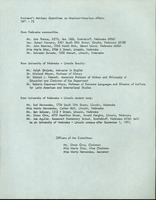 This document lists the President's Advisory Committee on Mexican-American Affairs members names. These members are arraigned in three categories: Nebraska Communities, UNL Faculty, UNL Students. UNL faculty has four members represented on the committee; the other two categories have five members each (click on thumbnail to enlarge image).
This document lists the President's Advisory Committee on Mexican-American Affairs members names. These members are arraigned in three categories: Nebraska Communities, UNL Faculty, UNL Students. UNL faculty has four members represented on the committee; the other two categories have five members each (click on thumbnail to enlarge image). -
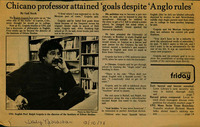 Professor Ralph Grajeda is interviewed in this article which appeared in the Daily Nebraskan on February 2, 1978.
Professor Ralph Grajeda is interviewed in this article which appeared in the Daily Nebraskan on February 2, 1978. -
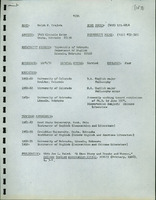 This is the Curriculum Vitae of Professor Ralph Grajeda in 1972. Within this document is evidence of Grajeda's involvement with many local and national Chicano organizations. This is the vita that was submitted to the University at the beginning of Grajeda's employment as an instructor in UNL's English department (click on thumbnail to enlarge image).
This is the Curriculum Vitae of Professor Ralph Grajeda in 1972. Within this document is evidence of Grajeda's involvement with many local and national Chicano organizations. This is the vita that was submitted to the University at the beginning of Grajeda's employment as an instructor in UNL's English department (click on thumbnail to enlarge image). -
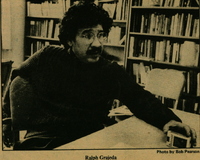 This is a photo by Bob Parsons of Dr. Ralph Grajeda, professor in the department of English at the University of Nebraska-Lincoln which was first published in the Daily Nebraskan newspaper on February 24, 1978. The image is of Grajeda sitting at his desk in Andrews Hall on the UNL campus. He appears to be in conversation with someone just out of frame. Behind Professor Grajeda are shelves full of books.
This is a photo by Bob Parsons of Dr. Ralph Grajeda, professor in the department of English at the University of Nebraska-Lincoln which was first published in the Daily Nebraskan newspaper on February 24, 1978. The image is of Grajeda sitting at his desk in Andrews Hall on the UNL campus. He appears to be in conversation with someone just out of frame. Behind Professor Grajeda are shelves full of books.
